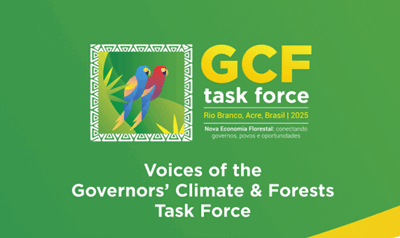Indonesia
Governors and Delegates
Aceh
Governor (Acting)
Achmad Marzuki
Delegates
A. Hanan
Head of Environmental & Forestry Agency
a.hanan1968@gmail.com
T. Ahmad Dadek
Head of Development Planning Agency at Subnational Level
tadadek@gmail.com
Central Kalimantan
Governor
H. Sugianto Sabran
Delegates
Nuriyakin
Regional Secretary
nuryakindas@gmail.com
Rizky Ramadhana
Head of Plantation Agency
galaxy.kalteng2020@gmail.com
East Kalimantan
Governor
Dr. Ir. H. Isran Noor, M.Si.
Delegates
Daddy Ruhiyat
Head of Climate Change Regional Council
daddyruhiyat@yahoo.com
Anwar Sanusi
Head of Environmental Service
sanusidisdik@gmail.com
North Kalimantan
Governor
Drs. Zainal Arifin Paliwang, S.H., M.Hum
Delegates
Ms. Nur Laila
Acting Head of Forestry Agency
dishutkaltara.laila@gmail.com
Mr. Rahmat Wahyullah
Head of Environmental Agency
hamsi.cbm@gmail.com
West Kalimantan
Governor
Dr. Harisson
Delegates
Gusti Hardiansyah Machmud
Head of Working Group REDD+
gusti.hardiansyah@gmail.com
Adi Yani
Head of Environmental and Forestry Agency
adiyani2002@gmail.com
Papua
Governor
Ridwan Rumasukun (Acting)
Delegates
Dr. Estiko Tri Wiradyo
Papua Delegate
estiko.papua@gmail.com
Mrs. Martha Mandosir
Papua Delegate
marthamandosir33@gmail.com
West Papua
Governor (Acting)
Drs. Paulus Waterpauw,M.Si
Delegates
Professor Charlie D. Heatubun
Head of Regional Research and Innovation Agency
charlie_deheatboen@yahoo.com
Reymond Yap
Head of Environmental Agency
News from Indonesia
Video Release: Voices of the GCF Task Force 2025
In the wake of New York Climate Week and in the lead up to COP30, state and provincial leadership on climate, biodiversity, sustainable finance, and community-focused investments is more important than ever. The Governors' Climate and Forests Task Force continues to...
Norwegian Visit to West Kalimantan
On August 25-26, 2025, the West Kalimantan Provincial Government received a visit from a representative of the Norwegian Development Cooperation Agency (NORAD), Ms. Borghild Tonnessen-Krokan. She was accompanied by representatives of the Norwegian Embassy in Jakarta,...
Carbon Markets Access Toolkit for Governments
On August 21, 2025, the Governors’ Climate and Forests Task Force (GCFTF) participated in the launch of the Voluntary Carbon Markets Integrity Initiative (VCMI)’s updated “Accessing High-Integrity Carbon Markets on the Road to COP30: A Toolkit for Policymakers.” This...
“We can solve any problem that may arise. The most important is that when it is necessary, we are together, united.”
– Puyr dos Santos Tembé
Agricultural Supply Chains
In 2019 GCF Task Force members in Indonesia launched a Steering Committee on Sustainable Agriculture in Indonesia (SCAI), a multistakeholder partnership that seeks to advance sustainable, deforestation-free agricultural commodity production at a jurisdictional scale. SCAI is led by provincial leaders and representatives from GCF Task Force provinces alongside farmer cooperatives and commodity traders, including Serikat Petani Kelapa Sawit (SPKS) and Gabungan Pengusaha Kelapa Sawit Indonesia (GAPKI). The provinces of Aceh, West Kalimantan, and Central Kalimantan are currently leading pilot activities for the GCF Task Force’s SCAI initiatives in Indonesia.
In Aceh support is being provided to map the main agricultural and forestry commodities in two Forest Management Unit (FMUs). This data will be used to improve the RPHJP (long term forest management plans) for the FMUs, seeking to develop models for local communities to generate income while protecting Aceh’s unique forest ecosystems.
In Central Kalimantan the focus is on improving data quality related to the distribution and production of the province’s principal commodities: palm oil, cacao, coconut, rubber, and coffee. This data will be used by the provincial government to improve its spatial plan, known as Rencana Tata Ruang Wilayah (RTRW) in Indonesia.
In West Kalimantan SCAI is expanding the recognition of smallholder rights by formally recognizing productions with Plantation Business Registration Certificates for Cultivation (Surat Tanda Daftar Usaha Perkebunan untuk Budidaya), known locally as STD-B certificates. These efforts are focused in the districts of Sanggau and Sintang, and will be scaled in the coming years to other districts and provinces within the GCF Task Force.
Jurisdictional Strategies & Investment Plans
Aceh
An Integrated Low Emission Development Strategy for Aceh
Aceh hopes that through its low-emissions development strategy to meet its deforestation reduction target of at least 80% by 2020 and beyond (Rio Branco Declaration). The project also aims to improve sustainable management of forests in the province due to strengthened governance systems, partnerships and incentives, while attracting sufficient resources.
Outcomes:
- The integrated Low Emission Strategy for Aceh (ILEDSA) was endorsed and implementation plan validated by key stakeholders.
Local Partners: Fauna & Flora International
Central Kalimantan
An Overarching Strategy for Low-Emission Development in Central Kalimantan
The project aimed to develop (1) Effective policies and programs for reducing
deforestation and improving rural livelihoods at the provincial level; (2) Legally-binding spatial and
management plans for ensuring the protection and restoration of forests, peatland and other important ecosystems; (3) Legally-binding spatial and management plans for ensuring the protection and restoration of forests, peatland and other important ecosystems; (4) Strengthened governance for reducing deforestation in state forest areas, including forest management units (FMU).
Outcomes:
- Effective policies and programs for reducing deforestation and improving rural livelihoods at
the provincial level. The activities is conducted by appointing the unit to register the
strategy with NRS by the governor, developing LED-OPS, and consultation between
stakeholders. The activity also followed by ensuring women participation in the meeting and
the decision making; - Completed the Environmental Protection and Management Plan (RPPLH and Strategic
Environmental Assessment (KLHS), which integrate the REDD+ strategy into regional
planning processes; - Developed a REDD+ strategy for the district of Seruyan;
- Developed business plan model for FMUs across the province.
Local Partners: Earth Innovation Institute
East Kalimantan
Mobilizing Resources and Building Capacity for the Implementation of Emission Reduction Efforts in East Kalimantan
East Kalimantan Province is committed to becoming one of the global leaders in
mitigating climate change by controlling the drivers of deforestation and forest degradation, balancing production to meet market demands with protection of critical landscapes, while enhancing community’s livelihoods. The goal of this project was to reduce emission of 22 MtCO2e contributing to Indonesia’s NDC and FCPF and contribute to East Kalimantan’s Rio Branco commitment by 2024.
Outcomes:
- Improved stakeholder collaboration through through stakeholders mapping, focus group
discussions, and agreements between relevant stakeholders; - Developed concept notes to fill the identified funding gap of $23.6M to support the
province’s emissions reductions goal; - Increased finance from the Restoration Fund by over 37%.
Local Partners: The Nature Conservancy (TNC)
North Kalimantan
Readliness for Jurisdictional Land-Based Low Carbon Development of North Kalimantan
North Kalimantan is the youngest province in Indonesia which established in 2012 and
as a result is still developing critical REDD+ planning tools and mechanisms. The project aimed to lay the foundations to develop and implement low-emissions development (building on the provincial GHG Action Plan), including a low-carbon strategy.
Outcomes:
- Developed and strengthened institutional arrangements and capacity on carbon inventory- the
first steps in developing a jurisdictional strategy in North Kailmantan.
Local Partners: The Nature Conservancy (TNC)
Papua
Building Robust Jurisdictional Strategies and Investment Plans to Reduce Deforestation and Promote Low Emissions Development in Papua
In Papua, the forest cover is around 81% and the deforestation rate of around 13,220
ha/year it is smaller compared to the national average. The biggest thread of forest in Papua is come from government development programs, especially from issuing massive permits for logging and forest conversions, and also the law enforcement. Improving the forest governance as well as increasing equal participation of the indigenous is seen as one of the solutions to reduce deforestation and degradation. Promoting the Forest Management Unit (KPH or FMU) as a key element of forest governance reform for embracing REDD+ and related initiatives is very important to support sustainable development through identifying drivers of deforestation and forest degradation and to target locations for specific mitigation actions.
Outcomes:
- Forest governance will be strengthened to be able to effectively implement REDD+ actions in line with regional development plans (RPJMD/RPJP and RAD-GRK) and contribute to the Rio Branco Declaration in the Province of Papua.
Local Partners: IDH
West Kalimantan
Strengthening Strategy and Capacity of West Kalimantan Province to Support National Target and Jurisdictional Approach in Reducing Carbon Emissions from Deforestation and Degradation
The activity is conducted to strengthen the strategy and capacity of West Kalimantan Province to
Support National target and Jurisdictional Approach in Reducing Carbon Emissions from Deforestation and Degradation. This project will facilitate the support from the private sectors especially from the agriculture and forestry sectors in supporting the SRAP REDD+ and relevant policies, and work collaboratively with the provincial government. The project also aimed to improve gender equality in REDD+ planning.
Outcomes:
- Evaluation of the regional REDD+ action plan (SRAP REDD+) for period 2012-2018 and GGP
implementation against carbon emission reduction target, including effectiveness of REDD+
task force governance, activity and financial barriers, and carbon reduction; - Capacity building for the SRAP REDD+ task force and relevant platforms through
development of relevant regulation and policy at the province level, increasing the
participation of women, and developing information on REDD+ and making available online; - Develop initial phase of governance structure for potential financing mechanism scheme for
REDD+ and green investment, including proposal submitted to the Green Climate Fund, an
$8M coconut facility under review by the Tropical Landscapes Financing Facility (TLFF) for
which Unilever has agreed to be the offtaker, and a proposal to the Green Fund; - Regulatory framework to support implementation of SRAP REDD+ and West Kalimantan’s
Green Growth Plan; - Strengthen local forest governance through mainstreaming the SRAP REDD+ into Mid-Term
Forest Management Plan of FMU Kubu Raya;
Local Partners: IDH
West Papua
A Strategy for Green and Inclusive Growth in West Papua
Forests still cover approximately 90% of the province of West Papua. West Papua
along with Papua also has special autonomy fund that can be used for supporting indigenous Papuans. The provincial government has made several efforts to promote sustainability, including declaring West Papua a “Conservation Province”. The project goal is to develop an overarching strategy for low emission development in West Papua and strengthen local governance and funding through financial plans for FMUs.
Outcomes:
- Long term develop plan (RPHJP) developed for six FMUs; three have already been passed into
law; - Investment protocol developed for FMUs;
- Financial partnerships for FMUs, including MOU signed with CV Nutrima Sehatalami off-taker for honey from Fakfak FMU. Engagement with PT Alam Sari Interbuana, CV Nutrima Sehatalami,
Unilever, PepsiCo, Supernova, Atsiri (a fragrance company based in Indonesia), Clarmondial (an
impact investor in Europe), and Agricorp (an agribusiness based in Monaco) to invest in
sustainable businesses West Papua;
Local Partners: Earth Innovation Institute



